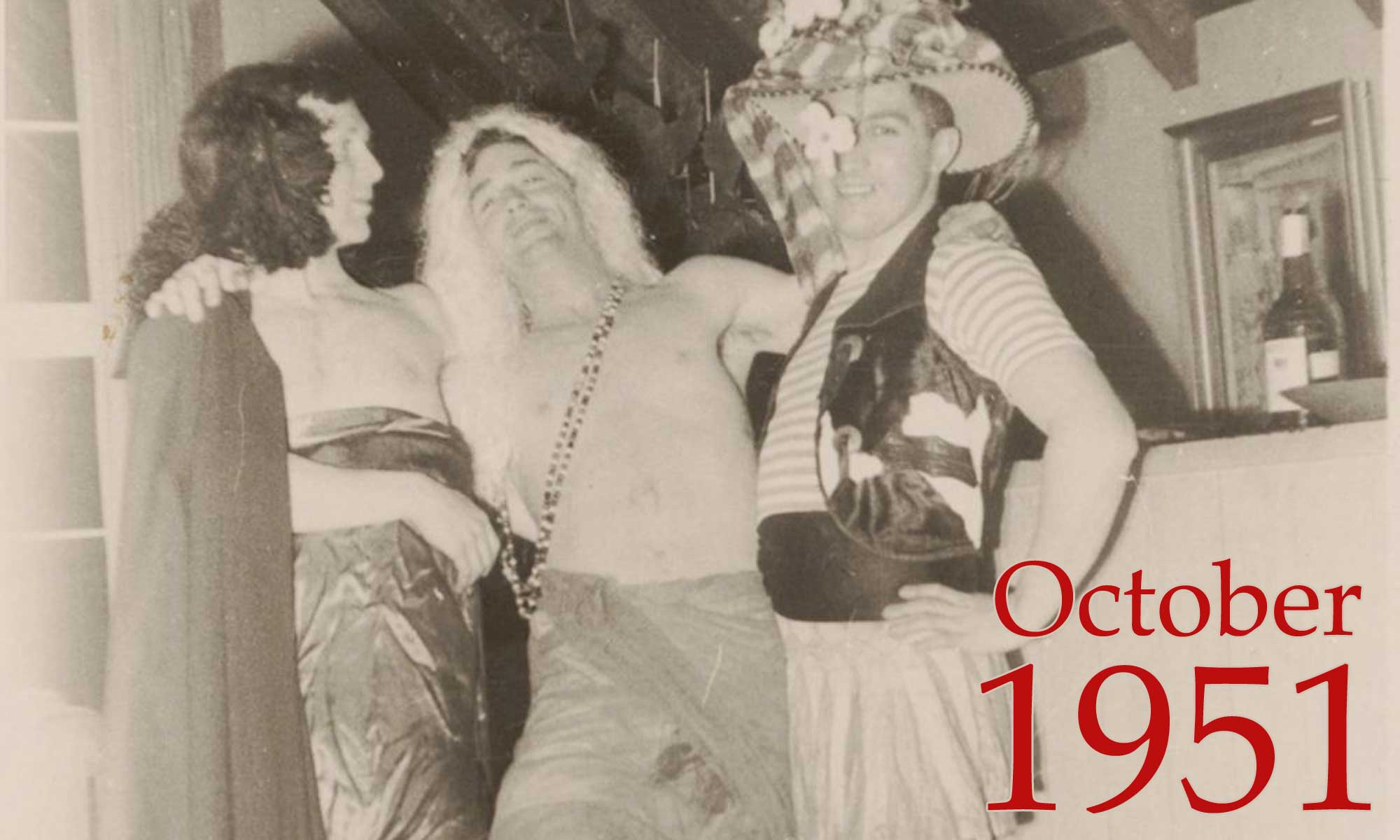| ◄ OCTOBER ► | ||||||
|---|---|---|---|---|---|---|
| ◄ 1951 ► | ||||||
| 1 | 2 | 3 | 4 | 5 | 6 | |
| 7 | 8 | 9 | 10 | 11 | 12 | 13 |
| 14 | 15 | 16 | 17 | 18 | 19 | 20 |
| 21 | 22 | 23 | 24 | 25 | 26 | 27 |
| 28 | 29 | 30 | 31 | |||
| President: | Harry S Truman (D) | |||
| Vice-President: | Alben W. Barkley (D) | |||
| House: | 233 (D) | 196 (R) | 1 (Other) | 2 (Vacant) |
| Southern states: | 103 (D) | 2 (R) | ||
| Senate: | 50 (D) | 46 (R) | ||
| Southern states: | 22 (D) | |||
| GDP growth: | 5.5% | (Annual) | ||
| 0.2% | (Quarterly) | |||
| Inflation: | 6.5% | |||
| Unemployment: | 3.5% | |||
| US killed in action, | 1,758 | (This month) | ||
| Korean conflict: | 26,280 | (Since Jun 28, 1950) | ||
![]() Oct 1: The U.N. Security Council votes to hear Britain’s complaint against Iran’s nationalization of the British-owned Anglo-Iranian Oil Company’s facilities in southwestern Iran. British ambassador to the U.N. Sir Gladwyn Jebb calls the crisis a threat to the “whole of the Free World,” which “will be much poorer and weaker including the deluded Iranian people themselves.” Jebb calls Iran’s actions “a great step … toward anarchy in international affairs.” The Security Council agrees to put off debate for a couple of weeks to give the Iranian Prime Minister time to travel to travel to New York and address the council. Because that date will be long past the deadline Iran has set for the expulsion of 300-some employees remaining at AIOC’s confiscated refinery in Abadan, Britain announces that they will be evacuated by Thursday deadline.
Oct 1: The U.N. Security Council votes to hear Britain’s complaint against Iran’s nationalization of the British-owned Anglo-Iranian Oil Company’s facilities in southwestern Iran. British ambassador to the U.N. Sir Gladwyn Jebb calls the crisis a threat to the “whole of the Free World,” which “will be much poorer and weaker including the deluded Iranian people themselves.” Jebb calls Iran’s actions “a great step … toward anarchy in international affairs.” The Security Council agrees to put off debate for a couple of weeks to give the Iranian Prime Minister time to travel to travel to New York and address the council. Because that date will be long past the deadline Iran has set for the expulsion of 300-some employees remaining at AIOC’s confiscated refinery in Abadan, Britain announces that they will be evacuated by Thursday deadline.
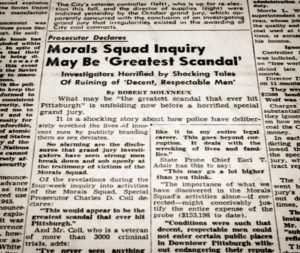 Oct 3: Grand Jury reveals “the greatest scandal that ever hit Pittsburg.” Given the city’s vast mob networks and endemic corruption, that’s saying something. A special state-empaneled grand jury, empaneled to investigating municipal corruption, finds, according to special prosecutor Charles D. Coll, something that “goes beyond corruption. It deals with the wrecking of lives and family.” For three years, Pittsburgh’s vice squad has been arresting men for approaching officers for “immoral purposes.” Some of these cases involve brazen entrapment techniques, but many cases circumvent even that small legal fig leaf when police use false testimony and violence to build their cases. The arrested men are given a choice: either pay bribes or be prosecuted, with their names and addresses appearing in the papers. Most pay. The money is funneled through fake accounts at the Police Credit Union, of which vice chief Lt. Louis Morgan just happens to be Secretary-Treasurer. “Conditions were such that decent, respectable men could not enter certain public places in Downtown Pittsburgh without endangering their reputations, homes and families.” Morgan and ten officers will be indicted, tried, convicted, and sentenced to various prison terms over the next two years. The vice squad is quietly disbanded.
Oct 3: Grand Jury reveals “the greatest scandal that ever hit Pittsburg.” Given the city’s vast mob networks and endemic corruption, that’s saying something. A special state-empaneled grand jury, empaneled to investigating municipal corruption, finds, according to special prosecutor Charles D. Coll, something that “goes beyond corruption. It deals with the wrecking of lives and family.” For three years, Pittsburgh’s vice squad has been arresting men for approaching officers for “immoral purposes.” Some of these cases involve brazen entrapment techniques, but many cases circumvent even that small legal fig leaf when police use false testimony and violence to build their cases. The arrested men are given a choice: either pay bribes or be prosecuted, with their names and addresses appearing in the papers. Most pay. The money is funneled through fake accounts at the Police Credit Union, of which vice chief Lt. Louis Morgan just happens to be Secretary-Treasurer. “Conditions were such that decent, respectable men could not enter certain public places in Downtown Pittsburgh without endangering their reputations, homes and families.” Morgan and ten officers will be indicted, tried, convicted, and sentenced to various prison terms over the next two years. The vice squad is quietly disbanded.![]() Oct 3: With the Chinese and North Koreans stalling the resumption of truce talks, allied forces in the south open a massive artillery barrage north of Seoul in the area around Kaesong, the Communist-held city that had previously been the site of talks.
Oct 3: With the Chinese and North Koreans stalling the resumption of truce talks, allied forces in the south open a massive artillery barrage north of Seoul in the area around Kaesong, the Communist-held city that had previously been the site of talks.
![]() Oct 3: The White House discloses that the Soviet Union has recently detonated “another atomic bomb.” The spokesman adds, “In spite of Soviet pretensions that their atomic energy program is being directed exclusively toward peaceful purposes, this event confirms again that the Soviet Union is continuing to make atomic weapons.” White House sources say they are making this announcement in order to deprive the Soviets of any propaganda advantage from announcing it themselves. To protect intelligence methods and sources, the White House refuses to provide any further information. It will later be revealed that this test took place on September 24 in Kazakhstan, and yielded about 38 kilotons. This is the second nuclear device detonated by the Soviets. The first took place on August 29, 1949.
Oct 3: The White House discloses that the Soviet Union has recently detonated “another atomic bomb.” The spokesman adds, “In spite of Soviet pretensions that their atomic energy program is being directed exclusively toward peaceful purposes, this event confirms again that the Soviet Union is continuing to make atomic weapons.” White House sources say they are making this announcement in order to deprive the Soviets of any propaganda advantage from announcing it themselves. To protect intelligence methods and sources, the White House refuses to provide any further information. It will later be revealed that this test took place on September 24 in Kazakhstan, and yielded about 38 kilotons. This is the second nuclear device detonated by the Soviets. The first took place on August 29, 1949.
![]()
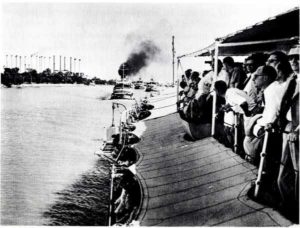 Oct 3: The remaining British personnel of the Anglo-Iranian Oil Company are evacuated without incident from Abadan, Iran. An airliner carrying sixteen nurses leaves from an airport near Abadan, while the rest are taken aboard the British cruiser HMS Mauritius , anchored on the Iraqi side of the Shatt-al-Arab River. The Mauritius cruises upriver about 40 miles to Basra, from where they will be flown home to London. Britons at home, who are in the midst of a general election campaign, see the evacuation as a humiliating economic Dunkirk. Winston Churchill, speaking at the opening of Conservative Party’s national campaign, accuses the Labour government of Prime Minister Clement Attlee of “inadvertence, incompetence, indecision and final collapse.” Churchill promises that his government’s efforts “will be directed toward national recovery, both home and abroad.”
Oct 3: The remaining British personnel of the Anglo-Iranian Oil Company are evacuated without incident from Abadan, Iran. An airliner carrying sixteen nurses leaves from an airport near Abadan, while the rest are taken aboard the British cruiser HMS Mauritius , anchored on the Iraqi side of the Shatt-al-Arab River. The Mauritius cruises upriver about 40 miles to Basra, from where they will be flown home to London. Britons at home, who are in the midst of a general election campaign, see the evacuation as a humiliating economic Dunkirk. Winston Churchill, speaking at the opening of Conservative Party’s national campaign, accuses the Labour government of Prime Minister Clement Attlee of “inadvertence, incompetence, indecision and final collapse.” Churchill promises that his government’s efforts “will be directed toward national recovery, both home and abroad.”
![]() Oct 4: The MGM musical film An American in Paris, premieres in New York City. It stars Gene Kelly, Leslie Caron, Oscar Levant, Georges Guétary, and Nina Foch.
Oct 4: The MGM musical film An American in Paris, premieres in New York City. It stars Gene Kelly, Leslie Caron, Oscar Levant, Georges Guétary, and Nina Foch.
![]() Oct 6: Soviet Premier Joseph Stalin publicly confirms that the U.S.S.R. has recently detonated an atomic bomb. Stalin says further tests of “various calibers” will take place from time to time. The statement, made under the guise of an interview with Pravda, is the first official statement about the Soviet Union’s nuclear weapons program.
Oct 6: Soviet Premier Joseph Stalin publicly confirms that the U.S.S.R. has recently detonated an atomic bomb. Stalin says further tests of “various calibers” will take place from time to time. The statement, made under the guise of an interview with Pravda, is the first official statement about the Soviet Union’s nuclear weapons program.
![]()
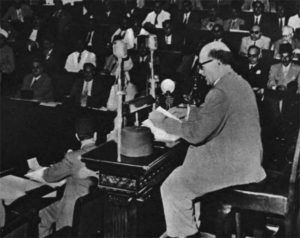 Oct 8: Perhaps encouraged by Britain’s forced evacuation of the Abadan refinery in Iran, Egyptian Premier Mustafa el-Nahhas Pasha goes before the Chamber of Deputies and announces a series of decrees abrogating the 1936 Anglo-Egyptian Treaty which granted the British government a lease in the Suez Canal zone to protect the Canal. He also abrogates anoter 1899 treaty giving Britain and Egypt administration over Sudan. The Egyptian government calls for the removal of all British troops from the canal zone, and proclaims the King of Egypt as king over Sudan. Britain counters that the treaty contains no abrogation clause, is still in effect, and will remain so for the remaining five years of the twenty-year treaty. Britain cancels all leave for troops in the canal zone.
Oct 8: Perhaps encouraged by Britain’s forced evacuation of the Abadan refinery in Iran, Egyptian Premier Mustafa el-Nahhas Pasha goes before the Chamber of Deputies and announces a series of decrees abrogating the 1936 Anglo-Egyptian Treaty which granted the British government a lease in the Suez Canal zone to protect the Canal. He also abrogates anoter 1899 treaty giving Britain and Egypt administration over Sudan. The Egyptian government calls for the removal of all British troops from the canal zone, and proclaims the King of Egypt as king over Sudan. Britain counters that the treaty contains no abrogation clause, is still in effect, and will remain so for the remaining five years of the twenty-year treaty. Britain cancels all leave for troops in the canal zone.
![]() Oct 8: The Communist High Command in Korea propose that truce talks resume at the abandoned and ruined hamlet of Panmunjom, located in a no-man’s land between Communist and allied forces near Seoul.
Oct 8: The Communist High Command in Korea propose that truce talks resume at the abandoned and ruined hamlet of Panmunjom, located in a no-man’s land between Communist and allied forces near Seoul.
![]()
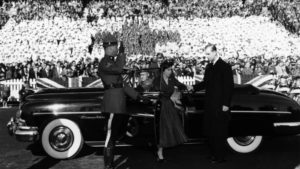 Oct 8: Princess Elizabeth and the Duke of Edinburgh arrive in Montreal to start their thirty-three-day tour of Canada. The couple had planned to sail from Britain in late September. But with the King’s sudden surgery taking place on September 23, the couple decided to delay their arrival by one week and to arrive by plane instead in order to spend more time in London. Massive and enthusiastic crowds greet the royal couple at every stop from Newfoundland to Vancouver.
Oct 8: Princess Elizabeth and the Duke of Edinburgh arrive in Montreal to start their thirty-three-day tour of Canada. The couple had planned to sail from Britain in late September. But with the King’s sudden surgery taking place on September 23, the couple decided to delay their arrival by one week and to arrive by plane instead in order to spend more time in London. Massive and enthusiastic crowds greet the royal couple at every stop from Newfoundland to Vancouver.
![]() Oct 9: Gen Matthew Ridgway, Commander of U.N. forces in Korea, accepts the Chinese and North Korean proposals for truce talks at Panmunjon. Liaison talks will resume the following morning in preparation for the resumption of truce negotiations.
Oct 9: Gen Matthew Ridgway, Commander of U.N. forces in Korea, accepts the Chinese and North Korean proposals for truce talks at Panmunjon. Liaison talks will resume the following morning in preparation for the resumption of truce negotiations.
![]() Oct 13: According to the United Nations’ Monthly Bulletin of Statistics, the feared global oil shortage caused by the shutdown of the Anglo-Iranian Oil Company’s fields in Iran has failed to materialize. The total output from non-Soviet bloc countries for June, when Iran’s oil was cut off, was 41 million metric tons. The production during June a year ago was 38 million metric tons, a figure which included Iranian oil.
Oct 13: According to the United Nations’ Monthly Bulletin of Statistics, the feared global oil shortage caused by the shutdown of the Anglo-Iranian Oil Company’s fields in Iran has failed to materialize. The total output from non-Soviet bloc countries for June, when Iran’s oil was cut off, was 41 million metric tons. The production during June a year ago was 38 million metric tons, a figure which included Iranian oil.
![]()
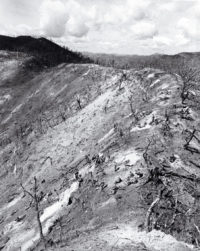 Oct 15: After more than a month of bloody assaults on Heartbreak Ridge, allied forces finally dislodge Communist troops from most of the mountain in eastern Korea. The intense thirty-three-day battle leaves 3,700 U.N. soldiers killed. A regimental commander sums up the battle: “There haven’t been any prisoners taken by either side on top of that mountain. The only casualties there have been the dead.”
Oct 15: After more than a month of bloody assaults on Heartbreak Ridge, allied forces finally dislodge Communist troops from most of the mountain in eastern Korea. The intense thirty-three-day battle leaves 3,700 U.N. soldiers killed. A regimental commander sums up the battle: “There haven’t been any prisoners taken by either side on top of that mountain. The only casualties there have been the dead.”
![]()
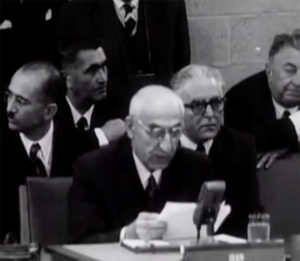 Oct 15: The United Nations Security Council opens debate on the dispute between Britain and Iran over the latter’s nationalizing the British-owned Anglo-Iranian Oil Company’s properties in Iran. Iran’s Prime Minister Mohammed Mossadegh tells the Security Council that Britain was guilty of interfering in Iran’s internal affairs and “sought to intimidate us by stationing warships just beyond our coastal waters and by sending air and land forces to the vicinity of Iran.” He reiterated his stand that the dispute was between Iran and a private company operating in Iran (even though the British government has a 53% stake in AIOC), and the International Court of Justice, therefore, has no jurisdiction. By the same token, he says the Security Council also has no jurisdiction although he does say Iran would be willing to re-open talks with Britain. He also denies that Iran’s actions has endangered the free world’s security. “Iran has stationed no gunboats in the Thames,” he says. The Security Council will fail to agree on a resolution aimed at ending the dispute.
Oct 15: The United Nations Security Council opens debate on the dispute between Britain and Iran over the latter’s nationalizing the British-owned Anglo-Iranian Oil Company’s properties in Iran. Iran’s Prime Minister Mohammed Mossadegh tells the Security Council that Britain was guilty of interfering in Iran’s internal affairs and “sought to intimidate us by stationing warships just beyond our coastal waters and by sending air and land forces to the vicinity of Iran.” He reiterated his stand that the dispute was between Iran and a private company operating in Iran (even though the British government has a 53% stake in AIOC), and the International Court of Justice, therefore, has no jurisdiction. By the same token, he says the Security Council also has no jurisdiction although he does say Iran would be willing to re-open talks with Britain. He also denies that Iran’s actions has endangered the free world’s security. “Iran has stationed no gunboats in the Thames,” he says. The Security Council will fail to agree on a resolution aimed at ending the dispute.
![]() Oct 15: The legendary sitcom I Love Lucy debuts on CBS.
Oct 15: The legendary sitcom I Love Lucy debuts on CBS.
![]()
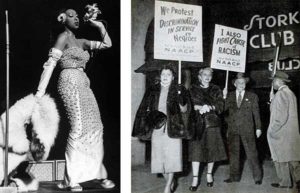 Oct 16: The legendary African-American singer Josephine Baker arrives with friends at Manhattan’s most prestigious supper club, the Stork Club, to celebrate her last show at the Roxy. An hour after she ordered her steak and shrimp, she notices that others around her are being served nothing has arrived at her table. It turns out that the club’s owner, Sherman Billingsley, had seen Baker and asked a waiter, “Who let her in?” — and all service stopped at her table. Furious at the snub, Baker and a friend go to a phone booth and call the NAACP’s executive secretary and Deputy Police Commissioner Billy Rowe. After the phone calls are placed, a waiter rushes to her table with the steak she had ordered. But Baker refuses to eat it. “I have no intention of suffering deliberate humiliation without striking back,” she says. Grace Kelly also happens to be there. She is so outraged by what she sees that shoe rushes over to Baker, took her by the arm and the two of them loudly storm out with Grace’s party in tow. Kelly and Baker had never met before, but from that moment on they were lifelong friends. Before the night is over, a huge scandal has broken over the radio and the newspapers. The NAACP will picket the club and challenge (unsuccessfully) its cabaret and liquor licenses. The Stork Club will continue operating through 1965, but its reputation will never recover.
Oct 16: The legendary African-American singer Josephine Baker arrives with friends at Manhattan’s most prestigious supper club, the Stork Club, to celebrate her last show at the Roxy. An hour after she ordered her steak and shrimp, she notices that others around her are being served nothing has arrived at her table. It turns out that the club’s owner, Sherman Billingsley, had seen Baker and asked a waiter, “Who let her in?” — and all service stopped at her table. Furious at the snub, Baker and a friend go to a phone booth and call the NAACP’s executive secretary and Deputy Police Commissioner Billy Rowe. After the phone calls are placed, a waiter rushes to her table with the steak she had ordered. But Baker refuses to eat it. “I have no intention of suffering deliberate humiliation without striking back,” she says. Grace Kelly also happens to be there. She is so outraged by what she sees that shoe rushes over to Baker, took her by the arm and the two of them loudly storm out with Grace’s party in tow. Kelly and Baker had never met before, but from that moment on they were lifelong friends. Before the night is over, a huge scandal has broken over the radio and the newspapers. The NAACP will picket the club and challenge (unsuccessfully) its cabaret and liquor licenses. The Stork Club will continue operating through 1965, but its reputation will never recover.
![]()
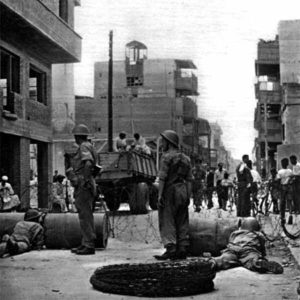 Oct 16: British troops battle Egyptian rioters in the Suez Canal zone cities of Port Said and Ismailia. Twelve Egyptians are killed and at least 100 are injured. As many as 7,000 Egyptians are trying to eject British troops from the zone.
Oct 16: British troops battle Egyptian rioters in the Suez Canal zone cities of Port Said and Ismailia. Twelve Egyptians are killed and at least 100 are injured. As many as 7,000 Egyptians are trying to eject British troops from the zone.
![]()
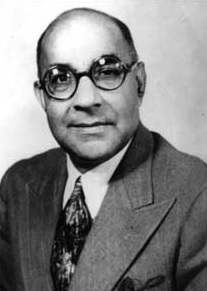 Oct 16: Pakistan’s Prime Minister Liaquat Ali Khan, one of the country’s founding fathers and its first Prime Minister, is assassinated while addressing a crowd of 100,000 people in Rawalpindi. His assassin, an Afghan national from the Pashtun Zadran tribe, is immediately killed by police.
Oct 16: Pakistan’s Prime Minister Liaquat Ali Khan, one of the country’s founding fathers and its first Prime Minister, is assassinated while addressing a crowd of 100,000 people in Rawalpindi. His assassin, an Afghan national from the Pashtun Zadran tribe, is immediately killed by police.
![]()
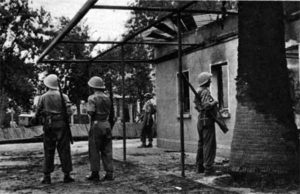 Oct 17: British forces in the Suez Canal Zone, backed by paratroopers from Cyprus, occupy bridges and communication centers in the zone following Egypt’s attempts to evict British troops.
Oct 17: British forces in the Suez Canal Zone, backed by paratroopers from Cyprus, occupy bridges and communication centers in the zone following Egypt’s attempts to evict British troops.
![]() Oct 19: Egyptian tanks and artillery pull back from the British defense perimeter along the Suez Canal. The Egyptian government puts Cairo under a precautionary state of emergency to prevent violence in the city. It also demands that all British troops immediately leave the Canal Zone. It also lays the blame for the October 16 riots in Ismailia and Port Said on British troops. “The British must have known that the announcement of abrogation would cause demonstrations and rejoicing by the people if the Canal Zone, and it was thus the duty of the British authorities to avoid all possible causes of friction.”
Oct 19: Egyptian tanks and artillery pull back from the British defense perimeter along the Suez Canal. The Egyptian government puts Cairo under a precautionary state of emergency to prevent violence in the city. It also demands that all British troops immediately leave the Canal Zone. It also lays the blame for the October 16 riots in Ismailia and Port Said on British troops. “The British must have known that the announcement of abrogation would cause demonstrations and rejoicing by the people if the Canal Zone, and it was thus the duty of the British authorities to avoid all possible causes of friction.”
![]() Oct 22: The U.S. tries to detonate a very small nuclear device at the Nevada Test Site. The device fizzles. Due to the smaller bomb’s failure to achieve criticality, observers see only “a flicker of light” from the conventional explosives used in the detonation process. Six hours later, the White House announces that the Soviet Union has recently detonated its third atomic bomb. Again, the White House spokesman cites “national security” in declining to say anything more about the Soviet detonation. It will later be revealed that the Soviets detonated a 42-kiloton bomb at a test site in Kazakhstan. This test is the Soviets’ first air drop test.
Oct 22: The U.S. tries to detonate a very small nuclear device at the Nevada Test Site. The device fizzles. Due to the smaller bomb’s failure to achieve criticality, observers see only “a flicker of light” from the conventional explosives used in the detonation process. Six hours later, the White House announces that the Soviet Union has recently detonated its third atomic bomb. Again, the White House spokesman cites “national security” in declining to say anything more about the Soviet detonation. It will later be revealed that the Soviets detonated a 42-kiloton bomb at a test site in Kazakhstan. This test is the Soviets’ first air drop test.
![]()
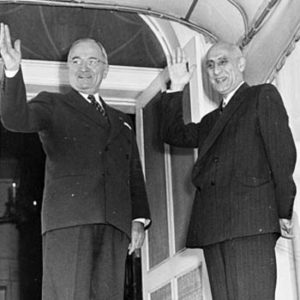 Oct 23: Iran’s Prime Minister Mohammed Mossadegh meets with President Truman at Blair House in Washington, D.C. The next day, Mossadegh will meet with Secretary of State Dean Achison to see a solution to Iran’s oil dispute with Britain.
Oct 23: Iran’s Prime Minister Mohammed Mossadegh meets with President Truman at Blair House in Washington, D.C. The next day, Mossadegh will meet with Secretary of State Dean Achison to see a solution to Iran’s oil dispute with Britain.
![]()
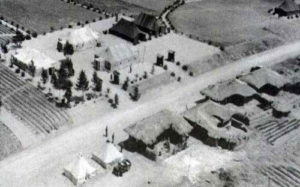 Oct 25: After several months’ delay, truce talks resume in Korea, this time in the tiny abandoned hamlet of Panmunjom.
Oct 25: After several months’ delay, truce talks resume in Korea, this time in the tiny abandoned hamlet of Panmunjom.
![]()
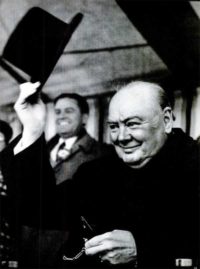 Oct 26: British voters, weary from twelve years of war and post-war austerity at home, and feeling besieged by events in Egypt and Iran that point to diminished British influence abroad, return a slim majority of Conservatives to Parliament. Winston Churchill, at seventy-seven years of age, becomes British Prime Minister again after defeating Clement Attlee’s Labour government in the general election.
Oct 26: British voters, weary from twelve years of war and post-war austerity at home, and feeling besieged by events in Egypt and Iran that point to diminished British influence abroad, return a slim majority of Conservatives to Parliament. Winston Churchill, at seventy-seven years of age, becomes British Prime Minister again after defeating Clement Attlee’s Labour government in the general election.
![]() Oct 26: Iranian Prime Minister Mohammed Mossadegh, who had planned to leave Washington this weekend, has agreed to stay in Washington in the hopes of arranging a settlement of the oil dispute with Britain once Winston Churchill organizes his new government.
Oct 26: Iranian Prime Minister Mohammed Mossadegh, who had planned to leave Washington this weekend, has agreed to stay in Washington in the hopes of arranging a settlement of the oil dispute with Britain once Winston Churchill organizes his new government.
![]()
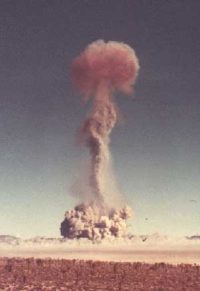 Oct 28: An early-morning nuclear detonation at the Nevada Nuclear Test Site briefly outshone the rising desert sun. The atomic bomb is dropped from a high-flying aircraft and yields 3.5 kilotons. A radioactive cloud spreads across a hundred miles of sky for three hours until it is dissipated by breezes. About five thousand combat troops are on hand thirty-five miles away from ground zero to observe the blast in preparation for atomic warfare exercises set to take place later in the week.
Oct 28: An early-morning nuclear detonation at the Nevada Nuclear Test Site briefly outshone the rising desert sun. The atomic bomb is dropped from a high-flying aircraft and yields 3.5 kilotons. A radioactive cloud spreads across a hundred miles of sky for three hours until it is dissipated by breezes. About five thousand combat troops are on hand thirty-five miles away from ground zero to observe the blast in preparation for atomic warfare exercises set to take place later in the week.
![]()
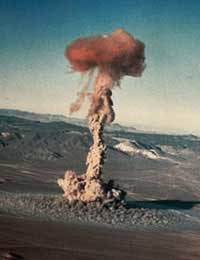 Oct 30: The third atomic bomb in less than two weeks is detonated at the Nevada Nuclear Test Site 75 miles north of Las Vegas. It is dropped from an aircraft and explodes 1,000 feet above the floor of Yucca Flat. Despite being detonated in full daylight an hour after sunrise, the flash is seen up to 270 miles away. Spectators in Las Vegas witness a great expanse of light across the horizon. With a yield of 14 kilotons, the blast is significantly more powerful than the test two days earlier. As before, about five thousand combat troops observe the blast in preparation for atomic warfare exercises in a couple of days. In addition, 2,000 special guests from Congress, the armed services and other agencies are present to witness it.
Oct 30: The third atomic bomb in less than two weeks is detonated at the Nevada Nuclear Test Site 75 miles north of Las Vegas. It is dropped from an aircraft and explodes 1,000 feet above the floor of Yucca Flat. Despite being detonated in full daylight an hour after sunrise, the flash is seen up to 270 miles away. Spectators in Las Vegas witness a great expanse of light across the horizon. With a yield of 14 kilotons, the blast is significantly more powerful than the test two days earlier. As before, about five thousand combat troops observe the blast in preparation for atomic warfare exercises in a couple of days. In addition, 2,000 special guests from Congress, the armed services and other agencies are present to witness it.
![[Emphasis Mine]](http://jimburroway.com/wp-content/uploads/2018/02/Witnesses.jpg)
